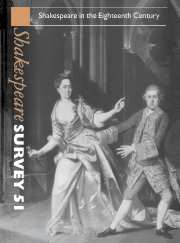Book contents
- Frontmatter
- Shakespeare and the Eighteenth Century: Criticism and Research
- Daddy’s Girls: Shakespearian Daughters and Eighteenth-Century Ideology
- Shakespeare and Clarissa: ‘General Nature’, Genre and Sexuality
- Early Georgian Politics and Shakespeare: The Black Act and Charles Johnson’s Love in a Forest (1723)
- Race Mattered: Othello in Late Eighteenth-Century England
- From Pericles to Marina: ‘While Women are to be had for Money, Love, or Importunity’
- ‘A Thousand Twangling Instruments’: Music and The Tempest on The Eighteenth-Centruy London Stage
- Double Falsehood and the Verbal Parallels with Shelton’s Don Quixote
- Eighteenth-Century Performances of Shakespeare Recorded in the Theatrical Portraits of the Garrick Club
- Eighteenth-Century Editing, ‘Appropriation’, and Interpretation
- Shakespeare Survey: Beginnings and Continuities
- Destined Livery? Character and Person in Shakespeare
- Prejudice and Law in The Merchant of Venice
- ‘Many A Civil Monster’: Shakespeare’s Idea of the Centaur
- Shakespeare’s International Currency
- Repeopling the Globe: The Opening Season at Shakespeare’s Globe, London 1997
- Shakespeare Performances in England, 1997
- Professional Shakespeare Productions in the British Isles, January–December 1996
- TheYear's Contributions to Shakespeare Studies: 1 Critical Studies
- 2 Shakespeare’s Life, Times, and Stage
- 3 Editions and Textual Studies
- Books Received
- Index to Volume 51
- General Index to Volumes 41–50
Early Georgian Politics and Shakespeare: The Black Act and Charles Johnson’s Love in a Forest (1723)
Published online by Cambridge University Press: 28 March 2007
- Frontmatter
- Shakespeare and the Eighteenth Century: Criticism and Research
- Daddy’s Girls: Shakespearian Daughters and Eighteenth-Century Ideology
- Shakespeare and Clarissa: ‘General Nature’, Genre and Sexuality
- Early Georgian Politics and Shakespeare: The Black Act and Charles Johnson’s Love in a Forest (1723)
- Race Mattered: Othello in Late Eighteenth-Century England
- From Pericles to Marina: ‘While Women are to be had for Money, Love, or Importunity’
- ‘A Thousand Twangling Instruments’: Music and The Tempest on The Eighteenth-Centruy London Stage
- Double Falsehood and the Verbal Parallels with Shelton’s Don Quixote
- Eighteenth-Century Performances of Shakespeare Recorded in the Theatrical Portraits of the Garrick Club
- Eighteenth-Century Editing, ‘Appropriation’, and Interpretation
- Shakespeare Survey: Beginnings and Continuities
- Destined Livery? Character and Person in Shakespeare
- Prejudice and Law in The Merchant of Venice
- ‘Many A Civil Monster’: Shakespeare’s Idea of the Centaur
- Shakespeare’s International Currency
- Repeopling the Globe: The Opening Season at Shakespeare’s Globe, London 1997
- Shakespeare Performances in England, 1997
- Professional Shakespeare Productions in the British Isles, January–December 1996
- TheYear's Contributions to Shakespeare Studies: 1 Critical Studies
- 2 Shakespeare’s Life, Times, and Stage
- 3 Editions and Textual Studies
- Books Received
- Index to Volume 51
- General Index to Volumes 41–50
Summary
The prolific playwright Charles Johnson wrote seventeen plays in the first three decades of the eighteenth century. Although they have received little critical attention, his works reveal the strategies of a dramatist who diligently offered London audiences a play almost every season. He was infamous for his plagiarism, and most of his plays are derived from other sources; his contemporary Christopher Bullock criticized Johnson for ‘diverting the Town with other People’s Writings, and endeavouring to acquire the Name of a Poet by transcribing from other Men’s Plays’. Johnson only used Shakespearian material as the basis for two plays, the 1716 afterpiece The Cobler of Preston, and the 1723 play Love in a Forest. Both adaptations were written in times of social turmoil; they are responses to specific historical conditions and events, and must be considered within that climate. This paper situates Charles Johnson’s adaptations of Shakespeare in the political context of the 1720s, specifically chronicling the connections between Love in a Forest and the circumstances surrounding the Black Act of 1723.
- Type
- Chapter
- Information
- Shakespeare Survey , pp. 45 - 56Publisher: Cambridge University PressPrint publication year: 1998
- 3
- Cited by



